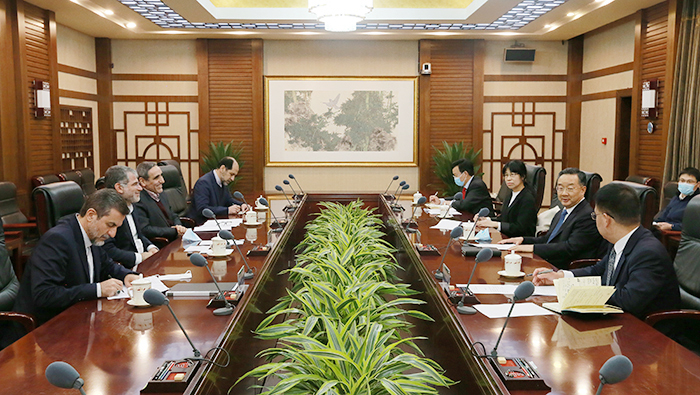As China's campaign to root out grain corruption grinds through its second year, communist party inspectors have determined that a parallel system of watchers and enforcers is needed to stop the bribery and trickery that threaten national food security.
A year ago communist party inspectors celebrated their success in nabbing mostly low-level granary managers. Since then more cases have come to light, including take-downs of people at the very top of the sprawling grain reserve system. Zhang Wufeng--head of the government bureau that oversees grain reserves--was expelled from the communist party in December. The Deputy Director of Sinograin--the state-owned company that manages the reserves was also caught. Last April inspectors in Heilongjiang Province--China's largest grain-producing region--said they had investigated over 1000 officials and arrested 92, including six in the Provincial grain bureau.
 |
Propaganda art promoting the grain corruption crackdown shows a rat
making off with a bag of money after chewing a hole in a grain bin. |
Last week the Central Commission on Discipline and Inspection (CCDI) issued an "Opinion on Deepening the Rectification of Corruption Problems in Grain Procurement and Sale" intended to address the "lack effective supervision and law enforcement" by deploying inspectors and accountants in a systematic manner to keep an eye on officials, organizations and companies in charge of buying, selling and storing grain. It calls for strong punishments as a deterrent to the "corruption problems behind chaos in the grain market." The CCDI document emphasizes "zero tolerance," "strict punishments," and promises that violators "will be caught."
Apparently exasperated with the web of misdeeds uncovered, CCDI issued a lengthy essay last week explaining the Opinion on grain corruption. The essay acknowledged that the grain marketing system is riddled with "systemic" corruption that includes skimming of funds, "circular" purchases of grain already in warehouses, fake transactions, downgrading of farmers' grain, and warehouses stocked with adulterated grain. CCDI said that the cases uncovered by the campaign revealed that grain corruption has not bottomed out and may actually be getting worse.
 |
| One of many photos showing inspectors checking grain reserves published by Chinese news media since last week. |
The essay said inspectors in Guangxi Province, for example, had investigated more than 1,000 incidents since last year. CCDI officials said their campaign against grain corruption launched in August 2021 had squashed many "rats" and "worms" in the grain system who stole money from public grain transactions, took bribes, and steered business to friends and associates.
The essay faulted a concentration of "gatekeeper power" in some provinces, presumably referring to leaders so powerful no one dares reveal any scandals. It pointed to insufficient personnel and weak organizations monitoring grain marketing, lack of accounting controls, and "problems" with personnel selection and management (hiring friends, relatives and mistresses?). The essay pointed to "internal and external collusion" between as many as five government departments and state-owned enterprises in each locality, plus the complexity of multiple levels of government for each of these entities--reserves and the entities that manage them have national, provincial, and city branches.
The grain corruption problems reveal a mistaken presumption that officials operating state-owned companies and Government bureaus will act in the public interest. This fallacy is crystallized by the anti-corruption essay's call for rooting out "shadow shareholders," "shadow companies," and "State skin, private bones" (国皮民骨, state-owned companies operating private companies as subsidiaries). These cryptic terms refer to a case brought to light by inspectors in Heilongjiang Province last year in which 5 state-owned companies secretly held controlling shares in as many as 31 private companies. The subsidiary companies were allowed to illegally procure and store grain for government reserves and collect 100 million yuan in subsidies to store the grain in exchange for 10-million-yuan in bribes. The chief perpetrator implicated was a deputy director of Beidahuang, one of China's model state-owned agribusiness companies that is the commercial arm of the state-farm system in Heilongjiang. The fraud was conducted with the complicity of county government officials.
Xi Jinping thought he could inculcate moral values in his atheist officials by forcing them to study his important speeches and by taking officials to historic communist sites where they pledged their allegiance to the party. Now the party is having to install a parallel system of inspectors to monitor and punish officials who violate the rules.
But what motivates the inspectors? The CCDI essay complained that people already tasked with oversight often just go through the motions and turn a blind eye to violations. Surely the communist party inspectors are motivated by the potential reward of promotion through the party ranks to gain appointment as party secretary of a state-owned enterprise or a department that regulates them with all the attendant perks and cash. However, if the inspectors were to succeed in their job by eliminating corruption and turning state-owned company offices into atheist monasteries, what motivation do they have to do their job? Perhaps yet another layer of inspectors will be needed to inspect the inspectors.
Officials probably should shift some of their study sessions from Marx to Machiavelli.






